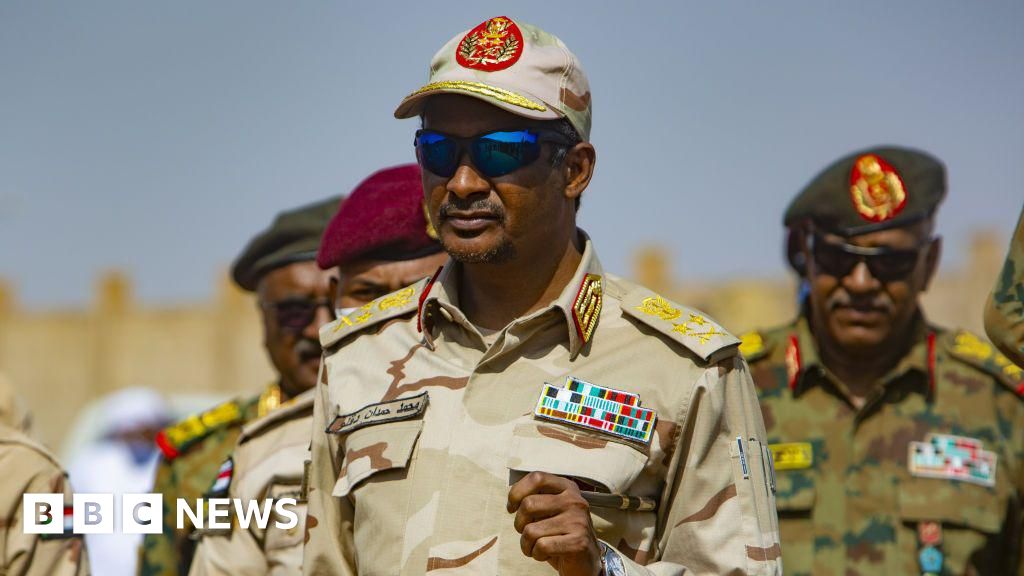Sudan's RSF paramilitaries agree humanitarian ceasefire

```html Sudan's RSF Agrees to US-Proposed Humanitarian Ceasefire Amid Famine Crisis
Sudan's paramilitary Rapid Support Forces (RSF) has announced its agreement to a US-proposed humanitarian ceasefire. The announcement comes after the RSF seized the strategically important city of el-Fasher in the Darfur region, exacerbating an already dire humanitarian crisis marked by widespread starvation and reports of mass killings. The Sudanese military-led government has yet to formally respond to the RSF's statement.
El-Fasher Seizure and Humanitarian Catastrophe
The RSF's capture of el-Fasher followed an 18-month siege that severely restricted humanitarian aid access, despite repeated appeals from the United Nations. The UN has confirmed famine conditions within the city, with residents unable to flee and facing critical food shortages. The situation has drawn international condemnation and intensified pressure on both the RSF and the Sudanese government to de-escalate the conflict and allow for the delivery of essential supplies.
According to a recent report by Islamic Relief, community kitchens, which have been a lifeline for millions affected by the civil war, are on the verge of collapse due to neglect, shortages, and volunteer exhaustion. The potential closure of these kitchens threatens to push even more Sudanese into starvation.
Ceasefire Proposal and Conditions
The ceasefire proposal, reportedly brokered by the United States, along with the United Arab Emirates, Saudi Arabia, and Egypt, aims to establish a three-month humanitarian truce, followed by a permanent ceasefire and a transition to civilian rule. The RSF stated its agreement to the truce "in order to address the catastrophic humanitarian consequences of the war" and facilitate the "urgent delivery" of aid.
The RSF also expressed its willingness to engage in discussions aimed at achieving a lasting peace that addresses the root causes of the conflict. However, skepticism remains high, given the repeated failures of previous ceasefire agreements.
Government Response and Sticking Points
While the RSF has signaled its acceptance of the ceasefire proposal, the Sudanese government's position remains unclear. Prior to the RSF's announcement, Sudan's Defence Minister Hassan Kabroun acknowledged the US's "efforts and proposals to achieve peace" but emphasized the ongoing preparations for the Sudanese people's battle against the RSF.
Mohamed Osman Akasha, Sudan's chargé d'affaires in Nairobi, told the BBC on Wednesday that the government would only agree to a cessation of hostilities if the RSF was dismantled, surrendered its weapons, and its leader was held accountable. This uncompromising stance highlights the deep-seated animosity and distrust between the warring factions, posing a significant obstacle to any lasting peace agreement.
Expert Analysis: A Fragile Hope
Dr. Fatima Hassan, a Sudanese political analyst at the University of Khartoum, cautions against premature optimism. "While the RSF's agreement to a ceasefire is a welcome development, it is crucial to remember that both sides have violated previous agreements. The key will be ensuring robust monitoring and enforcement mechanisms to prevent further breaches," she explains. "The international community must also address the underlying political and economic grievances that fuel the conflict."
Historical Context: Echoes of Darfur's Past
The current conflict in Sudan is deeply rooted in the country's complex history, particularly the Darfur conflict of the early 2000s. The RSF, originally known as the Janjaweed militia, emerged from that conflict and has been accused of widespread human rights abuses. The recent reports of mass killings in el-Fasher have evoked chilling memories of the atrocities committed during the Darfur conflict, raising concerns about the potential for further escalation and ethnic violence.
The Wider Regional Implications
The instability in Sudan has significant implications for the wider region. The conflict has displaced millions of people, creating a refugee crisis that is straining the resources of neighboring countries. The fighting has also disrupted trade routes and exacerbated existing economic challenges in the region. The international community is increasingly concerned about the potential for the conflict to spill over into neighboring countries and further destabilize the region.
The UN Human Rights Council is scheduled to hold an urgent session on the situation in el-Fasher on November 14, underscoring the international community's growing concern over the escalating violence and humanitarian crisis in Sudan. ```
Originally sourced from: BBC News Africa
